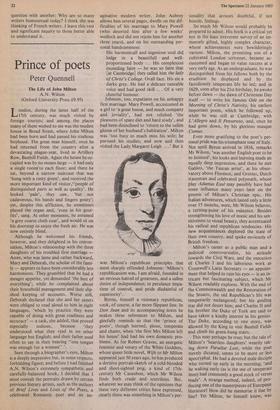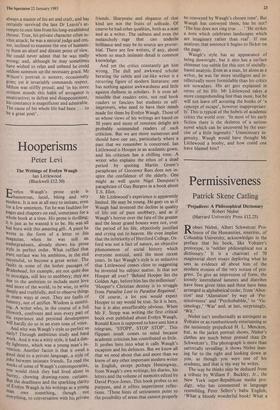Prince of poets
Peter Quennell
The Life of John Milton A.N. Wilson (Oxford University Press £9.95)
London, during the latter half of the 17th century, was much visited by foreign tourists; and among the places many of them wished to see was the modest house in Bread Street, where John Milton had been born and had passed his studious boyhood. The great man himself, once he had returned from the country after a devastating plague-year, lived in Artillery Row, Bunhill Fields. Again the house he oc- cupied was by no means large — it had only a single room/ to each floor; and there he sat, beyond a narrow staircase that was 'hung with a rusty green', and received the more important kind of visitor,"people of distinguished parts as well as quality'. He looked 'pale', they saw, 'but not cadaverous, his hands and fingers gouty'; yet, despite this affliction, he sometimes played the organ and, 'even in his gout- fits', sang. At other moments, he assumed 'a grey coarse cloth coat', and would sit on his doorstep to enjoy the fresh air. He was now entirely blind.
Although he welcomed his friends, however, and they delighted in his conver- sation, Milton's relationship with the three daughters of his troubled first marriage Anne, who was lame and rather backward, Mary and Deborah, the scholar of the fami- ly — appears to have been considerably less harmonious. They grumbled that he had a meagre appetite, yet demanded 'the best of everything'; while he complained about their household management and their slip- shod keeping of accounts. Worse still, Deborah declared that she and her sisters were obliged to read aloud to him in eight languages, 'which by practice they were capable of doing with great readiness and accuracy' — a task, she added, that proved
especially tedious, because 'they understood what they read in no other language but English; and their father used often to say in their hearing "one tongue was enough for a woman" '.
Seen through a biographer's eyes, Milton is a deeply impressive but, in some respects, forbidding figure; and before 1 had finished A.N. Wilson's extremely sympathetic and carefully-balanced book, 1 decided that I must consult the portraits drawn by certain previous literary artists, such as the authors of Brief Lives and Lives of the Poets, a celebrated Romantic poet and an im-
aginative modern writer. John Aubrey allows him several pages, dwells on the dif- ficulties of his marriage to Mary Powell (who deserted him after a few weeks' wedlock and did not rejoin him for another three years), and on his outstanding per- sonal handsomeness:
His harmonicall and ingeniose soul did lodge in a beautifull and well- proportioned body ... His complexion exceeding faire — he was so faire that [at Cambridge] they called him the lady of Christ's College. Ovall face. His eie a darke grey. He had a delicate tuneable voice and had good skill ... Of a very cheerful humour.
Johnson, too, expatiates on his unhappy first marriage. Mary Powell, accustomed as a girl to 'a great house, and much company and joviality', had not relished 'the pleasures of spare diet and hard study', and had been disinclined to 'return to the sullen gloom of her husband's habitation'. Milton was 'too busy to much miss his wife; he pursued his studies; and now and then visited the Lady Margaret Leigh ...' But it was Milton's republican principles that most sharply offended Johnson: 'Milton's republicanism was, I am afraid, founded in an envious hatred of greatness, and a sullen desire of independence; in petulance impa- tient of control, and pride disdainful of superiority'.
Byron, himself a visionary republican, took, of course, a far more flippant line. In Don Juan and its accompanying notes he makes three references to Milton, and gleefully reminds us that the 'prince of poets', though learned, pious, temperate and chaste, when 'the first Mrs Milton left his house' had had his own domestic pro- blems. As for Robert Graves, an energetic feminist and votary of the White Goddess, whose queer little novel, Wife to Mr Milton appeared just 5D years ago, he has produced a derisive portrait-sketch of a cold-blooded and short-sighted prig, a kind of 17th- century Mr Casaubon, which Mr Wilson finds both crude and scurrilous. But, whatever we may think of the opinions that these very different critics have expressed, clearly there was something in Milton's per-
sonality that arouses doubtful, if not hostile, feelings.
So much Mr Wilson would probably be prepared to admit. His book is a critical yet not in the least irreverent survey of an im- mensely gifted, highly complex character, whose achievements were bewilderingly various. Milton, the promising son of a cultivated London scrivener, became ac- customed and began to value success at a very early age. As an undergraduate, he was distinguished from his fellows both by the erudition he displayed and by the fastidiously temperate life he led; and in 1629, soon after his 21st birthday, he awoke before dawn — the dawn of Christmas Day itself — to write his famous Ode on the Morning of Christ's Nativity, his earliest important poem, which he followed up, while he was still at Cambridge, with L'Allegro and // Penseroso, and, once he had gone down, by his glorious masque Cornus.
Even more gratifying to the poet's per- sonal pride was his triumphant tour of Italy. Not until Byron arrived in 1816, remarks Mr Wilson, 'was another English poet to be so lionised'; his looks and learning made an equally deep impression, and there he met Galileo, 'the Tuscan artist', at his obser- vatory above Florence, and Grotius, Dutch statesman and celebrated polymath, whose play Adamus Exul may possibly have had some influence many years later on the genesis of Milton's Christian epic. His Italian adventures, which lasted only a little over 15 months, were, Mr Wilson believes, a turning-point of his existence. Besides strengthening his love of music and his sen- sitiveness to visual beauty, they accentuated his radical and republican tendencies. His new acquaintances deplored the state of their own country, and spoke enviously of British freedom.
Milton's career as a public man and a political controversialist, his attitude towards the Civil Wars, and the execution of Charles I and his laborious work as Cromwell's Latin Secretary — an appoint- ment that helped to ruin his eyes — is an in- tricate but fascinating subject, which Mr Wilson readably explores. With the end of the Commonwealth and the Restoration of the Stuarts, the old Republican's life was temporarily endangered; but his guiding star did not desert him; and Charles II and his brother the Duke of York are said to have taken a kindly interest in his genius. The Duke, according to one story, was allowed by the King to visit Bunhill Fields and climb his green-hung stairs.
This may perhaps be true; but the tale of Milton's 'heartless daughters' wearily tak- ing down Paradise Lost, while the poet sternly dictated, seems to be more or less apocryphal. He had a devoted male disciple who turned up early in the morning; 'and he waking early (as is the use of temperate men) had commonly a good stock of verses ready'. A strange method, indeed, of pro- ducing one of the masterpieces of European literature! How did he memorise it line by line? Yet Milton, he himself knew, was
always a master of his art and craft, and has certainly survived the late Dr Leavis's at- tempts to oust him from his long-established throne. True, his private character often in- vites attack; he was a natural judge and cen- sor, inclined to examine the rest of humani- ty from an aloof and distant point of view. He could never admit that he was really wrong; and, although he may sometimes have wished to relax and unbend he could seldom summon up the necessary grace. Mr Wilson's portrait is austere, occasionally grim; yet it invariably commands respect. Milton was stiffly proud; and `in his more strident moods this habit of arrogance is unattractive; in defeat and disappointment, his constancy is magnificent and admirable. The cause of his whole life had been ... to be a great poet'.







































 Previous page
Previous page